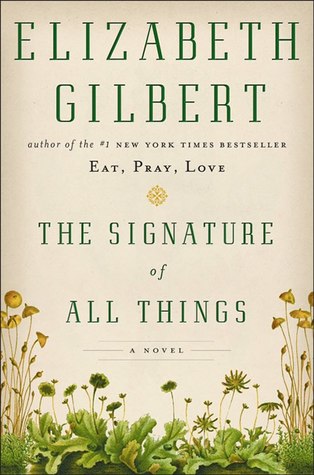The Signature of All Things
 Synopsis:
Synopsis:
In The Signature of All Things, Elizabeth Gilbert returns to fiction, inserting her inimitable voice into an enthralling story of love, adventure and discovery. Spanning much of the eighteenth and nineteenth centuries, the novel follows the fortunes of the extraordinary Whittaker family as led by the enterprising Henry Whittaker—a poor-born Englishman who makes a great fortune in the South American quinine trade, eventually becoming the richest man in Philadelphia. Born in 1800, Henry's brilliant daughter, Alma (who inherits both her father's money and his mind), ultimately becomes a botanist of considerable gifts herself. As Alma's research takes her deeper into the mysteries of evolution, she falls in love with a man named Ambrose Pike who makes incomparable paintings of orchids and who draws her in the exact opposite direction — into the realm of the spiritual, the divine, and the magical. Alma is a clear-minded scientist; Ambrose a utopian artist — but what unites this unlikely couple is a desperate need to understand the workings of this world and the mechanisms behind all life.
Exquisitely researched and told at a galloping pace, The Signature of All Things soars across the globe—from London to Peru to Philadelphia to Tahiti to Amsterdam, and beyond. Along the way, the story is peopled with unforgettable characters: missionaries, abolitionists, adventurers, astronomers, sea captains, geniuses, and the quite mad. But most memorable of all, it is the story of Alma Whittaker, who — born in the Age of Enlightenment, but living well into the Industrial Revolution — bears witness to that extraordinary moment in human history when all the old assumptions about science, religion, commerce, and class were exploding into dangerous new ideas. Written in the bold, questing spirit of that singular time, Gilbert's wise, deep, and spellbinding tale is certain to capture the hearts and minds of readers.
My Review:
I can't properly review this book without giving away the story so I will do my best not to give away anything but truly express what a wonderful book this really is. How does a person of science incorporate religious faith into their rational explanation of the world? Is the signature of all things based on scientific explanation or is the scientific explanation based on a much deeper less rational faith in the bigger plan God has for the world? This is Alma's quest through her very full and industrious life's search for knowledge and reason.
The seemingly irrelevant world of mosses turns out to be a parallel comparison of our very own world. Alma even refers to time as human time (very quick and fleeting) and moss time (which evolves over millions of years). When Alma comes to the realization that she is on human time and not moss time she begins to truly live and experience life. This involves acknowledging and testing her limitations and her strengths and realities. I know this doesn't tell you much about the story but this is a book to be experienced and I suppose to be interpreted by each reader uniquely. I loved it. It was as much Alma's journey through life as it was a journey for me reading it. I feel a different person after reading this book.
Simply a BRILLIANT work by a brilliant author.

No comments:
Post a Comment